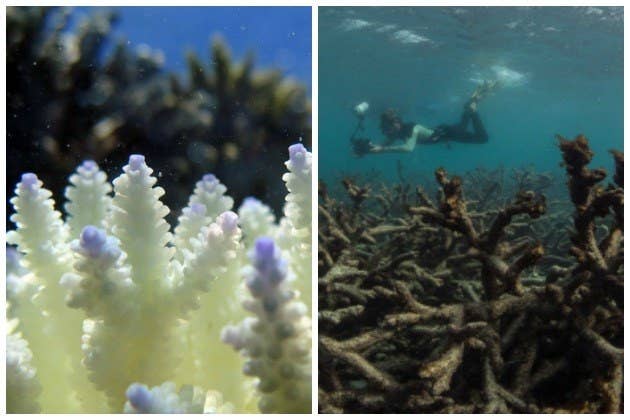A new Australian government report says "good progress" is being made on protecting the Great Barrier Reef but doesn't outline any plan to tackle coral bleaching caused by climate change.

The first Reef 2050 Plan annual report details Australia's progress in fulfilling its $2 billion commitment to the Unesco World Heritage Committee in March 2015 to keep the Great Barrier Reef off the "in-danger" list.
Twenty-nine points from the 151-point action plan have been completed, with 102 "underway" since its launch in March 2015.
But last summer's longest and most severe coral bleaching, which affected 93% of the reef, means the 2,300km world heritage site remains on Unesco's international watch list.

The 96-page report only mentions climate change a handful of times and fails to outline how the government will tackle the rising ocean temperatures that caused the coral bleaching and left 93% of the reef damaged.
Environment minister Josh Frydenberg confirmed in the report that 22% of coral on the reef had died as a result of last summer's hottest ever recorded temperatures, with 85% of mortality occurring in a 600km stretch in the far north.
"The severity of the event is variable and declines as you move southwards, with the far south showing only minor bleaching and no mortality," he said.
He acknowledged that the reef was under pressure from a range of sources, including climate change, and said an "expert group" had been assembled to write a paper advising on "likely climate change impacts" to the reef.
But rather than a commitment to tackling the cause of climate change, the report lists "monitoring the recovery of bleached coral and improving future responses" as a "key priority".

"I've said publicly that climate change is the biggest single threat to the reef," Frydenberg said on Wednesday.
But he contradicted scientists when he claimed the reef was "very resilient" and "does recover".
Professor Terry Hughes, convenor of the National Coral Bleaching Taskforce, estimates that only 7% of the reef was left unaffected by the latest bleaching event, and said it will never fully recover.
“We’ve lost a lot of 100-year-old coral,” Hughes told BuzzFeed News. “In terms of how long will it take for the northern reefs to rebound, I think it’s safe to say they won’t rebound to what they used to look like.”
According to scientists, we have now passed a point of no return: CO2 concentrations won’t go below 400ppm again within our lifetimes and with so much carbon in the atmosphere, ocean temperatures are predicted to warm, rapidly.
“We’re committed to bleaching now,” professor Charlie Veron, who is known as the godfather of coral, told BuzzFeed News earlier this year.
“We’ve created conditions that we’ll see the effects of in 20 to 25 years time. The present bleaching is a response to the amount of CO2 we had in the atmosphere in the 1990s. We’ve got a lot more carbon dioxide in the atmosphere today.”
The government announced a $1 billion package over 10 years for the reef during the election but the money is rebadged, not new, and no detail has been released on how it will help stem coral bleaching.
When asked by BuzzFeed News what the government was doing to curb the rising temperatures that lead to coral bleaching, the environment minister pointed to Australia's emissions reductions targets.


